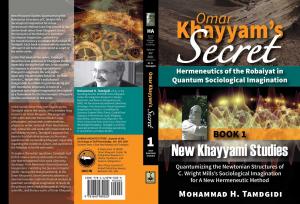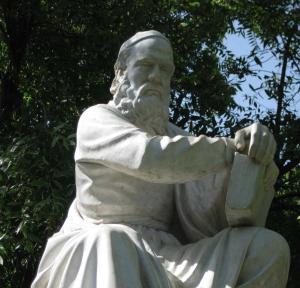OKCIR Unveils Omar Khayyam’s Secret By Way of Its Unriddling the Quantum Enigma
12-book series "Omar Khayyam’s Secret" advancing Robaiyat hermeneutics in quantum sociological imagination debuts with Book 1, launching New Khayyami Studies.
Building on his recent study in the transdisciplinary sociology of scientific knowledge subtitled "Unriddling the Quantum Enigma" (2020), in the new series, the quantum social theorist Mohammad H. Tamdgidi, Ph.D., will offer long sought solutions to centuries-old puzzles surrounding Omar Khayyam’s life and works, especially his Robaiyat.
“No one still properly knows who the historical Omar Khayyam was,” Tamdgidi writes, “because, in part, for one reason or another yet to be adequately understood, Khayyam himself also chose to live in a thick secretive tent of his works. He wished to live immortally in spirit and to be unmasked, but only as a result of persistent efforts like how he himself had become accustomed to when seeking an understanding of the nature and purpose of existence.”
“His pedagogy was certainly not that of offering the answers ready-made,” the series’ author notes, adding “Khayyam wished those interested in him to do the hard work, and it seems that centuries of hard work have still not born adequate fruit.”
In Tamdgidi’s view, “Khayyam had a message for the world, including the Iranian and the Islamic cultures, that has still not yet been deciphered. We need to take a sip of his Wine’s bittersweet wisdom to understand him anew. Nearly a thousand years after his birth, it is time to bring Omar Khayyam home.”
A part of its Tayyebeh Series in East-West Research and Translation, "Omar Khayyam’s Secret: Hermeneutics of the Robaiyat in Quantum Sociological Imagination" is a twelve-book series of which the book subtitled "New Khayyami Studies: Quantumizing the Newtonian Structures of C. Wright Mills’s Sociological Imagination for A New Hermeneutic Method" is the first volume. Each book is independently readable, although it will be best understood as a part of the whole series.
In the overall series, the transdisciplinary sociologist Mohammad H. Tamdgidi shares the results of his decades-long research on Omar Khayyam, the enigmatic 11th/12th centuries Persian Muslim sage, philosopher, astronomer, mathematician, physician, writer, and poet from Neyshabour, Iran, whose life and works still remain behind a veil of deep mystery. Tamdgidi’s purpose has been to find definitive answers to the many puzzles still surrounding Khayyam, especially regarding the existence, nature, and purpose of the Robaiyat in his life and works. To explore the questions posed, he advances a new hermeneutic method of textual analysis, informed by what he calls the quantum sociological imagination, to gather and study all the attributed philosophical, religious, scientific, and literary writings of Khayyam.
In the first book of the series, following a common preface and introduction to the series, Tamdgidi develops the quantum sociological imagination method framing his hermeneutic study in the series as a whole. In the prefatory note he shares the origins of the series and how the study is itself a moment in the trajectory of a broader research project. In his introduction, he describes how centuries of Khayyami studies, especially during the last two, have reached an impasse in shedding light on his enigmatic life and works, especially his attributed Robaiyat.
The four chapters of the book are then dedicated to developing the quantum sociological imagination as a new hermeneutic method framing the Khayyami studies in the series. In the first chapter, Tamdgidi raises a set of eight questions about the structure of C. Wright Mills’s sociological imagination as a potentially suitable framework for Khayyami studies. In the second chapter, he shows how the questions are symptomatic of Newtonian structures that still continue to frame Mills’s sociological imagination. In the third chapter, the author explores how the sociological imagination can be reinvented to be more in tune with the findings of quantum science. In the last chapter, the implications of the quantum sociological imagination for devising a hermeneutic method for new Khayyam and Robaiyat studies are outlined. In conclusion, the findings of this first book of the Omar Khayyam’s Secret series are summarized.
The method builds, in an applied way, on the results of Tamdgidi’s recent work in the transdisciplinary sociology of scientific knowledge, "Liberating Sociology: From Newtonian Toward Quantum Imagination: Volume 1: Unriddling the Quantum Enigma" (2020), where he explored extensively, in greater depth, and in the context of understanding the so-called “quantum enigma,” the chunky Newtonian and the duality-transcending quantum ways of imagining reality. In this first book of the Omar Khayyam’s Secret series, he shares the findings of that research in summary amid new applied insights developed in relation to Khayyami studies.
——————————————————————
Any secret that is in a sage’s heart sealed
Must be even more than phoenix from all concealed,
Since it’s from shell-hiddenness that becomes a pearl
That drop which is the ocean heart’s secret, congealed.
— Omar Khayyam (Tamdgidi translation)
——————————————————————
About the Author:
Mohammad H. (Behrooz) Tamdgidi, Ph.D., is the founding director and editor of OKCIR: Omar Khayyam Center for Integrative Research in Utopia, Mysticism, and Science (Utopystics) and its journal, "Human Architecture: Journal of the Sociology of Self-Knowledge" (ISSN: 1540-5699), which have served since 2002 to frame his independent research, pedagogical, and publishing initiatives. Tamdgidi holds a Ph.D. and M.A. in sociology in conjunction with a graduate certificate in Middle Eastern studies from Binghamton University (SUNY). He received his B.A. in architecture from U.C. Berkeley. He has previously also authored "Advancing Utopistics: The Three Component Parts and Errors of Marxism" (Routledge/Paradigm) and "Gurdjieff and Hypnosis: A Hermeneutic Study" (Palgrave Macmillan). He is a former associate professor of sociology specializing in social theory at UMass Boston and has taught sociology at SUNY-Binghamton and SUNY-Oneonta. Due to research commitments facing urgent deadlines, and preferences for written communication and privacy, the author can be reached only by email. All he wishes to share are done through his publications.
Mohammad H. (Behrooz) Tamdgidi
Okcir: Omar Khayyam Center for Integrative Research
pressrelease@okcir.com
Legal Disclaimer:
EIN Presswire provides this news content "as is" without warranty of any kind. We do not accept any responsibility or liability for the accuracy, content, images, videos, licenses, completeness, legality, or reliability of the information contained in this article. If you have any complaints or copyright issues related to this article, kindly contact the author above.



